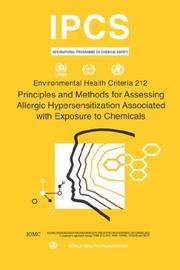| Listing 1 - 5 of 5 |
Sort by
|
Book
ISBN: 1872748503 Year: 1992 Publisher: Oxford : Bios scientific publ.,
Abstract | Keywords | Export | Availability | Bookmark
 Loading...
Loading...Choose an application
- Reference Manager
- EndNote
- RefWorks (Direct export to RefWorks)
Autoimmunity --- Auto-immunité --- Auto-immunité
Dissertation
ISBN: 903930596X Year: 1995 Publisher: Utrecht : s.n.,
Abstract | Keywords | Export | Availability | Bookmark
 Loading...
Loading...Choose an application
- Reference Manager
- EndNote
- RefWorks (Direct export to RefWorks)
Autoimmunity --- T-cell receptors --- Animal.
Periodical
ISSN: 23793708
Abstract | Keywords | Export | Availability | Bookmark
 Loading...
Loading...Choose an application
- Reference Manager
- EndNote
- RefWorks (Direct export to RefWorks)
Medicine --- Biology --- Biomedical Research. --- Research. --- biomedicine --- biology --- precision medicine --- immunology --- genetics --- autoimmunity
Article
Abstract | Keywords | Export | Availability | Bookmark
 Loading...
Loading...Choose an application
- Reference Manager
- EndNote
- RefWorks (Direct export to RefWorks)
Splenic cells from C57BL/6 mice housed in groups (six per cage0 or individually (one per cage) were analyzed for their ability to synthesize autoantibodies against autologous bromelain-treated erythrocytes. Group-housed male mice had a significantly lower number of autoimmune plaque forming cells (APFC) in their spleens than age matched female mice housed under similar conditions. However, when male mice were housed individually for 4 to 44 weeks, a marked increase in numbers of APFC were found in their spleens, approaching those of female control mice. Our results demonstrate that a simple environmental manipulation such as housing conditions can profoundly modulate autoimmune reactivity. Thus, alteration of the psychophysiological state determined by the quality of housing may significantly affect the development of autoimmune disease.
Ability. --- Age. --- Autoimmune plaques. --- Autoimmunity. --- Cage. --- Control. --- Density. --- Development. --- Disease. --- Female mice. --- Female. --- Group. --- Housing conditions. --- Housing. --- Immune response. --- Increase. --- Male-mice. --- Male. --- Mice. --- Mouse. --- Quality. --- Reactivity.

ISBN: 9241572124 Year: 1999 Volume: 212 Publisher: Geneva : WHO,
Abstract | Keywords | Export | Availability | Bookmark
 Loading...
Loading...Choose an application
- Reference Manager
- EndNote
- RefWorks (Direct export to RefWorks)
Blootstelling aan het milieu --- Environmental exposure --- Exposition environmentale --- Exposure [Environmental ] --- Immunological tolerance --- Immunologische tolerantie --- Immunotolerance --- Milieu [Blootstelling aan het ] --- Occupational Exposure --- Tolerance [Immunological ] --- Tolerantie [Immunologische ] --- Tolérance immunologique --- Allergy --- Chemically induced --- Autoimmunity --- Physiology --- Risk assessment --- Methods
| Listing 1 - 5 of 5 |
Sort by
|

 Search
Search Feedback
Feedback About UniCat
About UniCat  Help
Help News
News